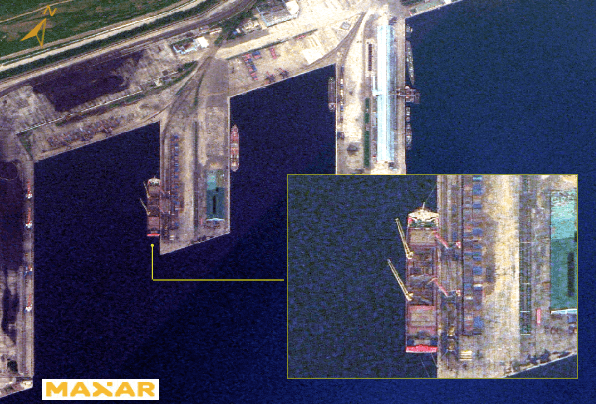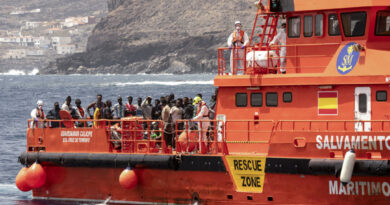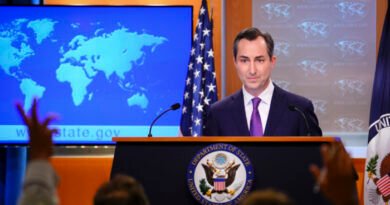The Potential Impact of North Korean Involvement on the Russia–Ukraine Conflict
The U.S. government has assessed that as many as 3,000 North Korean troops have arrived in Russia in recent weeks.
News Analysis
The foreign policy community is watching closely for signs that North Korean forces have joined the fighting in Ukraine, following the U.S. government’s announcement that it has seen signs Pyongyang has sent troops to Russia.
Addressing reporters in Rome on Oct. 23, Defense Secretary Lloyd Austin said the Pentagon has evidence pointing to a North Korean military presence in Russia. His comments reinforce earlier reports of North Korean troop movements raised by the South Korean and Ukrainian governments.
The White House has placed the number of North Korean troops in Russia at more than 3,000, though South Korea’s National Intelligence Service has assessed that as many as 10,000 North Korean troops have deployed there.
While Pyongyang has denied the report, Russian President Vladimir Putin appeared to confirm it.
He specifically mentioned Article 4 of the Russian partnership deal with North Korea, which deals with mutual defense.
“There is article 4. We have never doubted in the least that the North Korean leadership takes our agreements seriously. But what we do within the framework of this article is our business,” Putin said.
Exactly what these North Korean forces intend to do remains to be seen, but Ukrainian leaders have raised the alarm over the possibility that these forces may join the Russian side in the ongoing war.
If these North Korean troops do enter the war, it could help offset Russian losses after nearly three years of highly attritional fighting that has ground down both sides.
Earlier this month, the Pentagon estimated that Russia had sustained around 600,000 casualties thus far in the war, including troops killed or wounded on the battlefield. Exact casualties cannot be independently verified, and both sides have said little about their own losses throughout the war.
“If Russia is indeed forced to turn to North Korea for manpower, this would be a sign of weakness, not strength, on the part of the Kremlin,” White House National Security Council spokesman John Kirby said on Oct. 23.
To Be or Not to Be in Ukraine
A North Korean force deployment in Ukraine could raise the temperature of the ongoing war.
House Intelligence Chairman Mike Turner (R-Ohio) said the United States must treat the entry of North Korean troops into the ongoing conflict as a “red line.” Further, Turner said the United States should respond to any North Korean involvement in the war by relaxing limits on Ukraine’s use of U.S.-donated weapons to strike within Russian territory.
Ukrainian President Volodymyr Zelenskyy has, for months, pressed the Biden administration to allow expansive Ukrainian strikes on Russia with U.S. weapons.
Turner suggested even further steps if North Korean troops join the fighting inside Ukraine’s borders.
“If North Korean troops were to invade Ukraine’s sovereign territory, the United States needs to seriously consider taking direct military action against the North Korean troops,” he said.

South Korean National Intelligence Service handout issued on Oct. 18, 2024, shows recent satellite imagery of a Russian vessel departing North Korea’s port of Najin with North Korean weapons headed to Russia. Screenshot/South Korean National Intelligence
When asked how the United States would respond to such a North Korean deployment in Ukraine, Kirby said the administration would continue to increase security assistance to Ukraine but didn’t specify whether the United States would take any new steps.
“We’re talking to allies and partners about what the right next steps ought to be,” Kirby said.
Paul Davis, an adjunct professor for The Institute for World Politics, said if North Korean troops enter the fighting, “then there has to be serious consideration of Western forces putting boots on the ground” in Ukraine as well.
“Probably some of the Eastern European countries, Poland in particular, may be more engaged to add their troops into Ukraine because putting North Korean troops directly into the conflict definitely steps over a red line,” Davis told The Epoch Times.
Davis said that Ukraine’s Western backers may be concerned that Russia will be further emboldened if the West underreacts to North Korean involvement in the Ukrainian war.
Michael DiMino, public policy manager at Defense Priorities and former CIA military analyst, urged against treating a North Korean deployment in Ukraine as a major new development in the war. He predicted that even 10,000 North Korean troops would have little chance of significantly changing the course of the war for Russia.
“The fact that North Korea is willing to send 10,000 troops is notable, but it’s not something in my mind that really has to be taken for more than it is, right?” DiMino told The Epoch Times. “We don’t need to have NATO send 10,000 troops in response.”
DiMino further warned that the deployment of Western troops on the Ukrainian battlefield could quickly draw the entire North Atlantic Treaty Organization (NATO) alliance into the war, thereby bringing multiple nuclear-armed nations into the fighting on either side.
North Korean forces may assist the Russian war effort without crossing into Ukraine. In particular, these North Korean troops could help Russian forces finally drive back a Ukrainian incursion into Russia’s Kursk region, which began in August.

Ukrainian servicemen operate a Soviet-made T-72 tank in the Sumy region, near the border with Russia, amid the Russian invasion of Ukraine, on Aug. 12, 2024. Roman Pilipey/AFP via Getty Images
Davis and DiMino both agreed that limiting North Korea’s involvement in the fighting in the Kursk region could be seen as less inflammatory than if North Korean troops entered Ukraine.
What Russia and North Korea Stand to Gain
While Russia may see North Korea’s help as a way to offset combat losses and alleviate some of its battle-weary units, Pyongyang may see a combat deployment alongside Russian troops as a learning experience.
The last major conflict North Korean forces engaged in was the Korean War, a conflict that ended in an armistice in 1953.
“I think getting combat experience on a modern battlefield is a reason that North Korea wants to do this,” DiMino said.
Davis said Pyongyang may also be expecting Moscow to share military technology, including missile and nuclear arms advancements, in exchange for help in the Ukraine conflict.
Between Russia and North Korea, Davis said his biggest concern is what North Korea stands to gain from the partnership.
Western nations have increasingly sanctioned Russia and curtailed diplomatic ties with Moscow since the invasion of Ukraine began. These strained ties with the West have incentivized Moscow to focus on its other global partnerships.
Di
Source link





